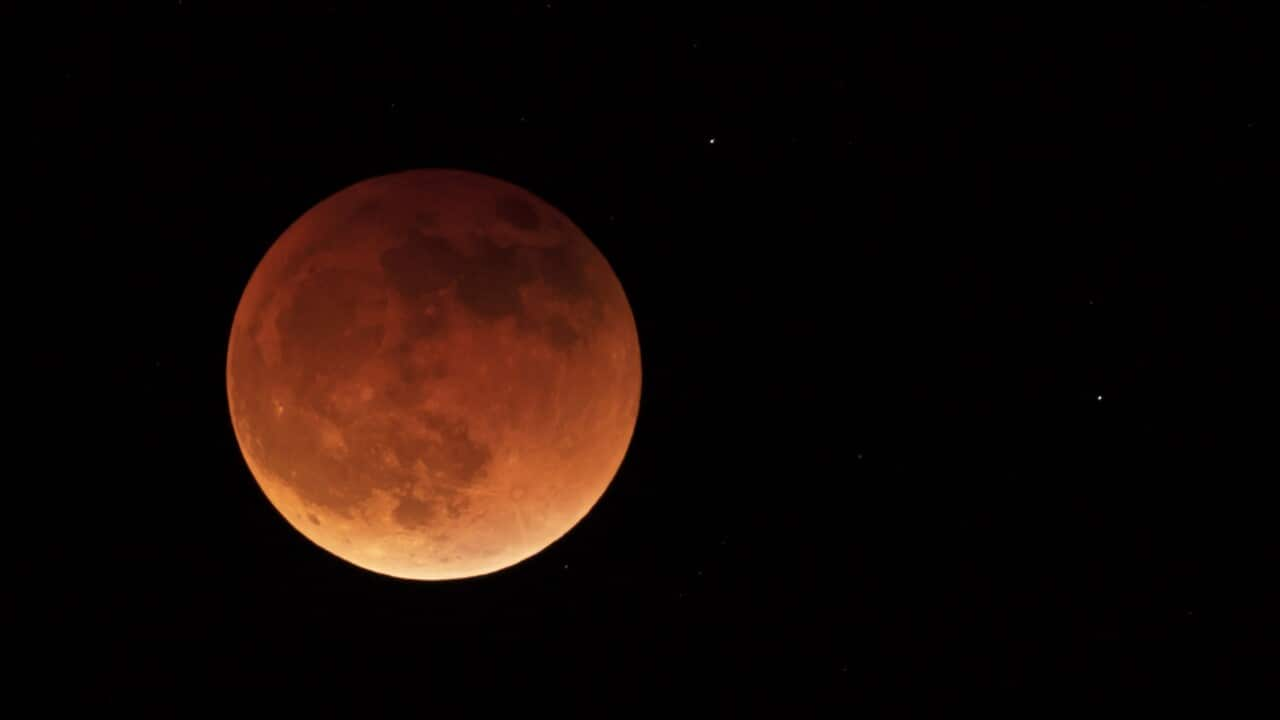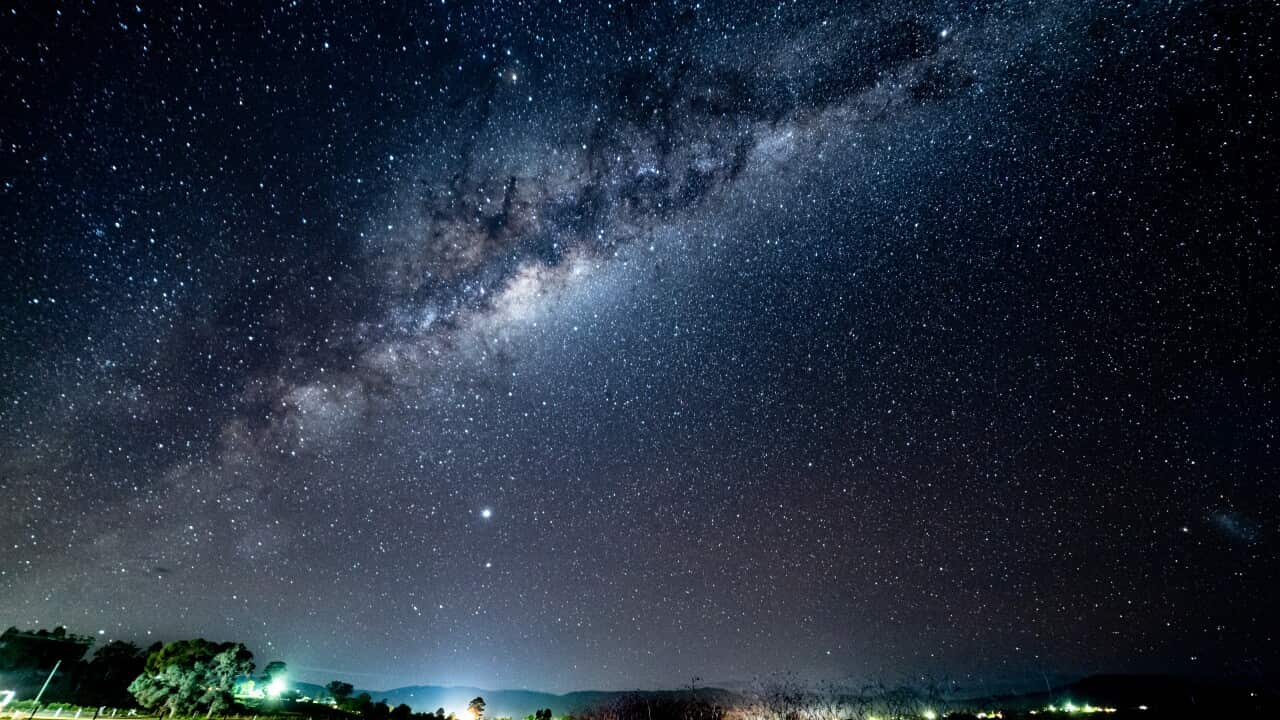Exmouth may already be familiar to some tourists thanks to the famous migration of whale sharks on the Ningaloo Reef during the middle of the year — but something even bigger is on its way in 2023.
An astronomical occurrence hundreds of years in the making is expected to see about 40,000 visitors head in the direction of the Western Australian town of just 2,500 people, about halfway between Perth and Broome, and the surrounding areas.
Dubbed the 'Ningaloo eclipse', a total solar eclipse will take place there at 11.29am on 20 April.
A total solar eclipse occurs when the moon passes between the sun and the Earth, totally blocking the sun. The moon's path will create a 40-kilometre-wide shadow.
It is an event that happens on any one part of Earth only every 400 years or so.
While there’s usually at least one solar eclipse viewable from Earth each year, the area from which they are visible is only ever quite small, and given two-thirds of the planet is covered by water, you can't always see them from land.
Kryss Katsiavriades, a retiree from the United Kingdom, booked his accommodation in Exmouth three years ago. To say he is an eclipse enthusiast would be an understatement; this will be the 19th total solar eclipse he’s travelled the world to see.
While clouds have interrupted his view on three occasions, he says it's always been worth the trip. Eclipses are like sunsets; each one can be quite different.
The longest total eclipse Mr Katsiavriades has seen was in Mexico when the sun was entirely covered by the moon for about seven minutes. A trip to Uganda in 2013 was all for 22 seconds of what those in the know refer to as ‘totality’.
In Exmouth, the eclipse will last 58 seconds, the Australian Space Agency says.

Kryss Katsiavriades (wearing red) saw his first total eclipse in Java in 1983. Source: Supplied / krysstal.com
“The sky colour starts to change and birds start to behave strangely. I like the colours of that time, so I tend to be looking around.”
Then, the shadow of the moon can be seen moving quickly across the earth.
“You can actually see it in the distance, sometimes that produces spectacular effects.”
Mr Katsiavriades has seen people overcome with emotion during an eclipse and learned of many different beliefs surrounding them.
In Colombia, he heard of people hiding under beds. In India, people refused to get on aeroplanes or public transport. In Chile, a pregnant woman said her family had asked her to stay inside during the eclipse so as not to bring bad luck to her unborn child.
Animals, including pet dogs, will act strangely too, Mr Katsiavriades says, as day appears to become night and then switches back again.

Kryss Katsiavriades enjoys photographing eclipses. He took this in Sulawesi, Indonesia, in 2016. Source: Supplied / krysstal.com
At an eclipse in Shanghai, fish started to jump out of the ocean.
Exmouth Shire council president Darlene Allston says planning for such a unique event has been a challenge, with the area’s isolation a big factor (Exmouth is 1,250 kilometres north of Perth).
“For those that are wanting to travel here, they really do need to book ahead,” she says.
“We want everyone to have a great time. But we also want everyone to respect Ningaloo and the environment for what it is.”

Tourists often pose in front of Exmouth's giant prawn which celebrates its prawn and fishing industry. Source: AAP / SUSANNA DUNKERLEY
The shire is estimating around 20,000 people will stay within the local area for the eclipse and a further 20,000 or so will converge up and down the coast within the Pilbara and Gascoyne regions. Spectators there should still be able to get a view of the eclipse if conditions are clear, but a small sliver of the sun will still be visible, allowing sunlight through.
While Exmouth usually has no public transport and only one road in and one out, shuttle buses will operate in the days around the eclipse to reduce congestion.
The region's authorities have also had to consider how the power network and water supply will cope with the extra demand, and food trucks will be brought in to back up the town’s cafes, pubs and restaurants.

The eclipse will coincide with peak tourist season in Exmouth when tourists flock to the area to swim with whale sharks. Source: Supplied / Tourism Western Australia
Campers must either stay at registered government campsites (most of which have already been booked) or approved accommodation. Rangers will be monitoring local beaches and car parks.
People in caravans are being asked to not empty their grey water improperly.
“We as a community respect our environment. So we will be putting the message out to try and help us keep it the way we love it,” Ms Allston says.

The Shire of Exmouth will be operating overflow camping setups and is allowing homeowners to open up their backyards to people looking to camp. Source: Getty / Photon-Photos
The only other part of Australia that will see the total solar eclipse in April will be Barrow Island, off WA's Pilbara coast, where the Chevron-operated gas project known as the Gorgon Project is.
The total solar eclipse will also be visible in eastern parts of Timor Leste and the province of Papua and Damar Island in Indonesia.

Depending on conditions in and around Exmouth, people may be able to see stars in the sky during the day when the moon eclipses the sun. Source: Supplied / Tourism Western Australia, Marco Kraus.
“I think it will still be a very interesting sight, even from Perth,” says Hadrien Devillepoix, research associate at the School of Earth and Planetary Sciences at Perth’s Curtin University.
“About 70 per cent of the sun will be obscured by the moon.
“Even in parts of the east of Australia, you'll still get something like 20 per cent of the surface of the sun obscured but you might still be able to observe something from there. So I think there'll be something for everyone.”

Those driving in Exmouth are warned to drive carefully and look out for emus. Source: Getty / MXW Stock
Tour guide Capes, a Naanda and Malgana man, will be sharing his Country with visitors as part of a special tour arranged to coincide with the eclipse.
“The stars and the moon tell us when it is time for certain foods because it tells us about the tides and what we can collect from the ocean,” he says.
“It’s all interrelated; the sea, the animals, food and the moon.”

Capes says his ancestors had a strong connection with the sun, moon and sky. Source: Supplied / Tourism Western Australia
“We’re taught not to point at shooting stars as they represent our Elders moving through the sky,” he says.
Shooting stars represent our Elders moving through the sky.- Capes, Tour guide
Capes says living and working on his Country sustains him culturally, mentally and spiritually and he's keen for others to experience it.
“It’s medicine for the soul.”
“We don’t want them just to come and see the eclipse, we want them to go away with a greater appreciation of what this place means and what this land means.”

Capes works for Wula Gura Nyinda Eco Adventures which means 'you come this way'. Source: Supplied / Tourism Western Australia: Russell Ord
They think of the sun as a woman and the moon as a man and believe the eclipse represents new stars and new life in the universe.
You should never look directly at the sun and it is dangerous to look at a total or partial eclipse with the naked eye, the Australian Radiation Protection and Nuclear Safety Agency (ARPANSA) advises.
Special eclipse viewing glasses are recommended and Mr Devillepoix also suggests people create a pinhole projector to see the phenomenon. More information about .
This article has been updated to clarify how to view an eclipse safely.












